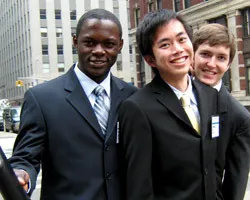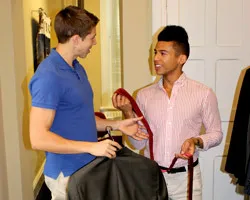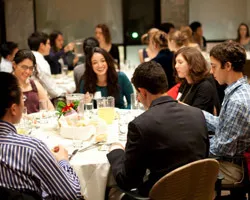Getting Down to Business
Resumes, Ratios, and the Right Fork

Wall Street Prep participant Kofi Anguah '09 (left) is currently a technology and information risk manager at Morgan Stanley.
Martin Griffith '06 is a pioneer.
Looking ahead to life after Swarthmore, Griffith wanted to start a family catering business. To develop the accounting, finance, and marketing skills to run it, he spent a summer at Dartmouth's Tuck School of Business Bridge Program with the help of what was then a new Swarthmore initiative: Educating Socially Responsible Leaders (ESRL). His experience, he says, was "critical" in paving the way from the classroom to the business world.
Having established the catering business (sold successfully to another company early this year), Griffith has since gone on to earn an M.B.A. from Georgetown University. Today, he is a manager at Green Generation Solutions, LLC, a Maryland firm that works with private-equity real estate groups to engineer, design, implement, and finance energy efficiency and sustainability improvements in existing buildings.
"I am passionate about the work we do," he says. "It's exciting to be sitting at the intersection of smart financial decisions and sound environmental policy."
An Asian studies major, Griffith got his start in a pioneering program designed to educate students in the liberal arts about business careers and prepare them to succeed professionally after college.

Miriam Zakhary '13
"It was great being part of a think tank where my ideas mattered."
Since then, ESRL has touched the lives of many hundreds of Swarthmore students, brought business-savvy alumni into the fold, and built on core offerings like Tuck Business Bridge to create programs ranging from economics to etiquette.
Although many ESRL programs focus on business, the students who sign on are contemplating all kinds of careers.
"When we first developed this program, we wanted to think outside the box about educating students in business and preparing them for careers after graduation," says Nancy Burkett, director of the Office of Career Services, which oversees ESRL. "We realized early on that the fundamental skills students need in business are also ones that prepare them for leadership positions in every walk of life."
Samantha Bennett '13, a political science major minoring in statistics and peace and conflict studies, received an Experiential Summer Fellowship award last summer under the aegis of ESRL. Mentored by Amber Anderson '01, Bennett served as an intern at Big Brothers Big Sisters in Philadelphia, where government funding had recently been cut. "I love the organization's goal of helping kids in need," Bennett says. "Ultimately, I want to do something with that—but I was also able to see the limitations of a nonprofit. At the same time, I was so thankful for this opportunity. I can't wait to become a Big Sister after I graduate."

Dressing for success: Alex Anderson '13 (right) and Cariad Chester '13 shop at the Career Closet.
Bennett's Experiential Summer Fellowship evolved from Swarthmore's Extern Program, a popular annual one-week job-shadowing opportunity. ESRL provides funding for students who, like Bennett, have completed externships and are returning for summer internships. In the past four years, 31 students have received awards of approximately $4,000 each from the College.
With the help of ESRL and mentored by John Irons '92, Bennett's classmate Mariam Zakhary '13, a double major in economics and psychology, was able to intern at the Economic Policy Institute last summer in Washington, D.C. "I learned about various economic fields, such as healthcare, anti-trust, and social insurance," Zakhary says. "It was great being part of an economic think tank where my ideas mattered."
Beyond summer awards and Tuck Business Bridge, ESRL offers a variety of on- and off-campus opportunities that give liberal arts students a greater perspective into the world of work:
Business Fundamentals for Liberal Arts Students. More than 40 students sign up for this noncredit course every year. Topics range from leadership and business strategy to operations management and financial reporting, presented in the larger context of responsibility, ethics, and values.
"We incorporate social responsibility into many aspects of ESRL," explains Erin Massey, associate director of Career Services, who oversees the program with Burkett. "In the business fundamentals course, students learn about effective leadership qualities and ethical decision-making in the business world."

Martin Griffith '05
"I am passionate about the work we do."
Career Development is a noncredit course that helps students assess their career interests, explore career options, and search for jobs and internships.
Life After Swarthmore is a series of programs designed to introduce practical life skills after graduation, whether it's finding a place to live, financial planning, repaying student loans, or navigating office politics. Alumni are often enlisted to advise students about settling into new jobs in new places.
Wall Street Prep is a two-day finance seminar that covers everything from financial modeling and valuation methodologies to income and cash flow statements, balance sheets, ratio analysis, and financial statement analysis. Fifteen to 25 Swarthmore students enroll in each session of this two-day program, which also includes students from Haverford and Bryn Mawr Colleges. Annual Wall Street receptions give students a chance to connect with alumni in business and finance. Last October, 58 alumni and 61 students got together in New York to meet and greet.
Julian Harper '08, an investment professional at Franklin Templeton Investments, is a veteran of Wall Street receptions and has helped organize similar events around business topics.

The right fork: "When students are confident, their good qualities shine through."
Both alumni and students benefit. For alumni, Harper says, "it's probably the best way to keep track of recent developments on campus and get a sense of students' perspectives and goals."
For students, these events offer valuable insights into what it takes for liberal arts majors to make the transition to Wall Street. "Although it's a stellar liberal arts college, Swarthmore is not a target for Wall Street banks," Harper says, "but many Swarthmore students are excellent candidates for jobs in finance."
The connections forged at Wall Street receptions give students confidence when they face the daunting application process. "They give students a chance to learn about opportunities in finance and make contacts that lead to an internship or full-time position," Harper explains.
Dapper Dining Professional Etiquette and Networking Program. Every year, more than 60 students sign up to learn about networking and dining etiquette to prepare for networking events and lunch interviews. Robert A. Shutt, president of RAS Associates and author of Shine While You Dine, instructs students in the arts of networking and navigating a three-course business dinner.
What works at Swarthmore may not work in the workplace, Shutt says. "The rules of etiquette change depending on the person, place, or purpose. Inappropriate behavior can distract from the many great qualities Swarthmore students have to offer."
Knowing which fork to use makes a difference. "I think my course inspires confidence," he says. "When students are confident in a dining situation, their good qualities will shine through."

Julian Harper '08
"Wall Street receptions give students a chance to make contacts."
Career Closet. Students can dress for success on a budget by borrowing professional attire from the Career Services Office for interviews, career fairs, and other career-building endeavors. Last year, students—male and female—shopped at the Career Closet 86 times.
"Many students will go to work in places where business casual is the norm," says Burkett. "They need a suit only once—for the job interview. The closet can save them considerable expense."
It is particularly handy for students far from home. Alex Anderson '13, a double major in Chinese and studio art who lives in Seattle, was happy to borrow a suit for a job-shadowing event. "You don't have to carry it back and forth across the country with all of your other stuff," he says.



